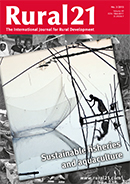Vol. 49 Nr. 3/2015: Sustainable fisheries and aquaculture

In the debate about food security and poverty alleviation the fishery sector is mostly mentioned only in passing, if at all, even though at least one billion people depend on fish as the main source of animal food and at least one-tenth of the world population depend for their livelihood on fisheries and aquaculture. The World Bank and FAO estimate that demand for aquatic food will continue to rise. But around one-third of all fish populations are already overfished. Large-scale illegal, unreported and unregulated fisheries worsen the problem, and also contribute to loss of revenues, employment and fish supplies for local populations. Numerous other factors, such as environmental pollution, littering and increasing extraction of raw materials from the seabed, and also natural disasters and climate change have an impact on the state of the oceans. How can we succeed in using aquatic resources sustainably while at the same time ensuring that inequalities in access to them are eliminated so that small-scale fishers and aquaculture communities also benefit from the value chains? Our authors present the challenges, lessons learned and approaches to solutions from the point of view of development cooperation, civil society and science.
Focus
- Sustainable management of fisheries and aquaculture - A key to food security and poverty alleviation
- Sustainable management of fisheries and aquaculture: a huge challenge for development cooperation
- Can aquaculture help the hungry poor?
- Towards sustainable tuna fisheries in the Philippines
- Building confidence in certified seafood: the GSSI
- Group certification: the silver bullet for smallholders?
- SSF Guidelines: Vital momentum for small-scale fishers
- Satellite data aid India’s fishermen for better livelihood
- Small fish with a big potential for women’s business?
- Mauritania: High tech to secure fish stocks



